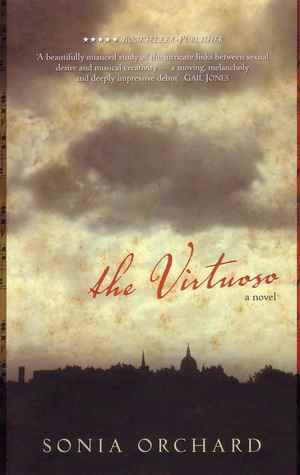
- Free Article: No
- Contents Category: Fiction
- Review Article: Yes
- Article Title: The other Noël
- Online Only: No
- Custom Highlight Text:
This novel is Sonia Orchard’s second book, published six years after her first, the compelling and intimate memoir Something More Wonderful (2003). For those who read the memoir – the harrowing story of her thirty-one-year-old friend’s battle with cancer – The Virtuoso may come as a surprise. Orchard has abandoned her own assured voice for that of a fictional and unreliable narrator, a young Englishman besotted with a concert pianist, slightly older than himself. The milieu is an eccentric circle of musicians and writers in 1940s London. If there is any similarity between Orchard’s memoir and her novel, it is the narrator’s stance as the observer, with a beloved and idealised friend at centre stage.
- Book 1 Title: The Virtuoso
- Book 1 Biblio: Fourth Estate, $27.95 pb, 368 pp
- Book 1 Cover Small (400 x 600):

- Book 1 Cover (800 x 1200):

The focus of this fictionalised biography is the Australian-born virtuoso pianist Noël Mewton-Wood, a protégé of Sir Thomas Beecham’s, who brought him to England in 1940. Mewton-Wood became a golden boy among his musical contemporaries. Orchard’s fascination with her subject is infectious, and her research is evident as she recreates the era and this group of artistic friends. One of the delights of this novel is the wealth of fascinating historical detail and thorough musical knowledge.
The character of Mewton-Wood is deftly drawn. His waggish voice is clear and seductive in its playfulness. The voice of the narrator – who is never given a name – seems tentative at first, and only acquires substance as he grows up and takes on the trappings of the London society and his homosexual circle. By then his voice is an echo of Mewton-Wood’s own: a wry, ironic banter, with a dash of smutty jokes and innuendo. A sample of this mature, worldly voice would have been enticing on the opening page, instead of the neutral tone that introduces the novel and reflects on the outbreak of World War II, when the narrator was ten years old. At this age, he was taken by his father to attend the weekday lunchtime concerts initiated by Dame Myra Hess at the National Gallery, and his love of classical music was born.
We are immersed in postwar London bohemia and the enclave of musicians that the narrator aspires to join. We meet Benjamin Britten and Peter Pears, George Bernard Shaw and E.M. Forster. Time and place are defined by the clipped English tones of the narrator and the formal, almost archaic phrasing and sentences that take us coolly along the trajectory of illicit romance. Only an occasional anachronism – such as a reference to ‘duvets’ in a world that relied entirely on blankets and eiderdowns – mars the illusion. The visual effect is of dapper restraint, oiled only by wild parties where bouts of excessive drinking and emotional outbursts were rife.
Once the narrator sees Mewton-Wood perform, the journey begins. Obsession drives the story and links perfectly with the extreme moods of the genius, the imagination of the composer and performer, the fantasy of the lover. In a quartet of sections, the book moves from a fantasy through a prelude and a fugue to a requiem, all linked by leitmotifs – a chartreuse silk sofa, Prussian blue pigment, a glossy ivy-green door – sensory details like musical phrases echoing across the movements of a symphonic work. Constant allusion is made to Robert and Clara Schumann, Beethoven and Tchaikovsky, whose lives run parallel to the lives of our narrator and his beloved. Particular pieces of music – Schubert’s Rondo in D and Schumann’s Fantasie opus 17 – resurface at crucial moments and thicken the web of deceit, misunderstanding, theft, and undeclared passion.
If the narrator is shadowy, the other characters step into the limelight with a line of smart dialogue or a pungent nosegay. Orchard is able to paint a character portrait in a few deft strokes of the writer’s brush:
Her father was an ornithologist – and as queer as a coot – with a large, rambling house filled with shelves overflowing with books, and ledges from which leered dusty stuffed raptors. Many a Sunday afternoon we’d sit at the piano in the sunroom, surrounded by cabinets of owl pellets that quivered away while we played Mozart and Schubert.
As for major characters, the narrator’s lover Gerald in particular, Orchard manages to override the point of view of the narrator, skewed by obsession, with the author’s subtle insights. Although Gerald can never replace the ideal lover the narrator yearns for, we can appreciate how much Gerald loves him. Amid the superficiality and debauchery, Orchard explores the nuances of relationships, and the psychology, motivation, and compromises that inform them.
But it is music that prevails in the lives of these people, and music that provides the cathartic climax and the enduring themes in the novel. Orchard’s passion for music and her research into the London coterie of MewtonWood will no doubt lead the reader to search out or revisit the music of Schumann, Schubert, Tchaikovsky, and Beethoven and to listen to Mewton-Wood’s recordings. In this way, The Virtuoso fulfils the function of a both a novel and a biography.


Comments powered by CComment